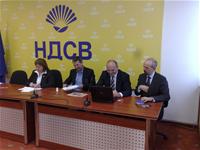Grey economy is growing because of the pro-crisis measures of the government in Bulgaria
Adelina Marini, March 7, 2010
 1 bn levs (512 mn euro) less revenues in the Treasury for January, compared to 2009, the Ministry of Finance reported while spending, increased by 540 mn levs (276 mn euro), Milen Velchev from the NDSV liberal party announced. A great part of this budgetary deficit is due to delayed payments of the state to companies which have public contracts. The Liberal party reminded that it warned the government in November that it needed to pay its debts by the end of 2009, no matter the danger of a minimal budgetary deficit (you can see more about it right from this article). According to Milen Velchev, who was a minister of finance in the Simeon Saxecobourggotta's government (2001-2005), the unreturned VAT is also rapidly growing. The debt of the government towards business does not improve the balance of the budget, quite on the contrary, he said, responding to the cabinet's explanations that it tried to balance public finances.
1 bn levs (512 mn euro) less revenues in the Treasury for January, compared to 2009, the Ministry of Finance reported while spending, increased by 540 mn levs (276 mn euro), Milen Velchev from the NDSV liberal party announced. A great part of this budgetary deficit is due to delayed payments of the state to companies which have public contracts. The Liberal party reminded that it warned the government in November that it needed to pay its debts by the end of 2009, no matter the danger of a minimal budgetary deficit (you can see more about it right from this article). According to Milen Velchev, who was a minister of finance in the Simeon Saxecobourggotta's government (2001-2005), the unreturned VAT is also rapidly growing. The debt of the government towards business does not improve the balance of the budget, quite on the contrary, he said, responding to the cabinet's explanations that it tried to balance public finances.
The former deputy finance minister, also from the NDSV, Lyubomir Datsov warned that if there was 5% drop of economic activity and the revenues' loss was 34% from January to January, this meant that the share of grey economy, smuggling and VAT frauds had increased. "Either the old smuggling channels have started to operate again or business is choosing grey economy en masse. Otherwise there is no other explanation if you have just 5% GDP reduction, the drop of revenues from VAT to have fallen by 45%. And the explanation that the reason is drop of exports is very funny. VAT is being collected on overall consumption basis and it has fallen by 5%", Mr Datsov underlined.
Vladimir Karolev paid attention to another issue which, he said, was happening for the first time in the country's most recent history: the distribution through GDP is the largest, even compared to the government of Lukanov (1990). He added that currently 43% of GDP was being seized and distributed by the state. He also criticised the explanations of the government that if the country would not be accepted in the exchange rate mechanism (ERMII), preceding eurozone's membership, the reason would be the problems in some neighbouring countries, especially Greece.
NDSV warned that the government interpreted and presented the conclusions of IMF's mission to Bulgaria last week in a wrong way. The prime minister Boyko Borisov and his finance minister Simeon Dyankov then said that the Fund had recommended 1.8% budgetary deficit for 2010. Vladimir Karolev showed IMF's conclusions and explained that the document was not saying it allowed deficit. Furthermore, Milen Velchev added - "Given the large uncertainties on the revenue side, it will be key that the budgeted spending limits are closely adhered to avoid risking an even larger deficit", he cited the IMF's conclusions.
"The real problem, which will hamper Bulgaria's accession to the exchange rate mechanism is that the ECB and other international financial institutions see serious fiscal risks in the unreformed pensions system (currently Bulgaria is spending 12% of its GDP for pensions). They also worry that if Bulgaria would join the ERMII, the country will loosen the belts. This risk is quite serious, given some very important ministers' behaviour", Mr Karolev added.
The president of the liberal party who is a former minister of labour and social policy Hristina Hristova outlined a new phenomenon which needed special attention and care - the so called, by her, crisis unemployed. Those are all people who were forced to take an unpaid leave because their employer cannot afford paying them, while in the same time, hoping for the situation to get better, would not let the workers out. These people are being considered by the statistics as officially employed and, because they have all their social securities paid, NDSV proposed that they should to be allowed to receive unemployment compensations under the same conditions as all other unemployed in the country. Hristina Hristova announced another proposal of her party - the term for payment of such compensations to be increased from 6-12 months, to 9-12 months.
To euinside's question whether the budget could afford money for such a measure, given the  fact that there was no official number how much these people are, Ms Hristova explained, that this was the money of the people who paid their taxes and social securities. "This is about an independent fund in the National Securities Institute which, unfortunately, was used in the years to finance pensions. Let it play its role to cover this risk", she called.
fact that there was no official number how much these people are, Ms Hristova explained, that this was the money of the people who paid their taxes and social securities. "This is about an independent fund in the National Securities Institute which, unfortunately, was used in the years to finance pensions. Let it play its role to cover this risk", she called.
But underlined that those were temporary and urgent measures. And as NDSV's president started the press conference with the introduction that in Europe there was a contest going on which national government would apply the most effective anti-crisis measures, euinside asked whether it was not time for Bulgaria to start thinking about exiting the crisis, which was also EU's agenda.
Hristina Hristova replied that given the above mentioned data, our country was still quite deeply in a crisis. "Second, exiting the crisis can be realised only through anti-crisis measures. But the government is applying pro-crisis measures currently", she underlined. And added that the time had come for the government to present a strategy for the development of the economy. "Our economy has no profile. They say the economies of all member states will be very different. This will help us realise what we should do with our human resources, what profile of qualification and training the economy would need, so that these human resources could be useful to the new direction of economy's development after the crisis".
Lyubomir Datsov exclaimed that he did not expect Bulgaria would keep its reputation of a cheap labour country where no one cares about wits and qualification. "Investments in education and science are a key to exiting the crisis. An exit also needs flexible and liberal labour market, focused on quality and not on people whom we just have to find a job, no matter they are not educated and with no qualification".
Iliya Lingorski on his part said that there was nothing worse for an economy than fear. If the state is accurate by paying its debts, reducing red tape and investing in future are the key to economic success, he concluded.
 | © European Union
| © European Union | © European Union
| © European Union | © European Union
| © European Union